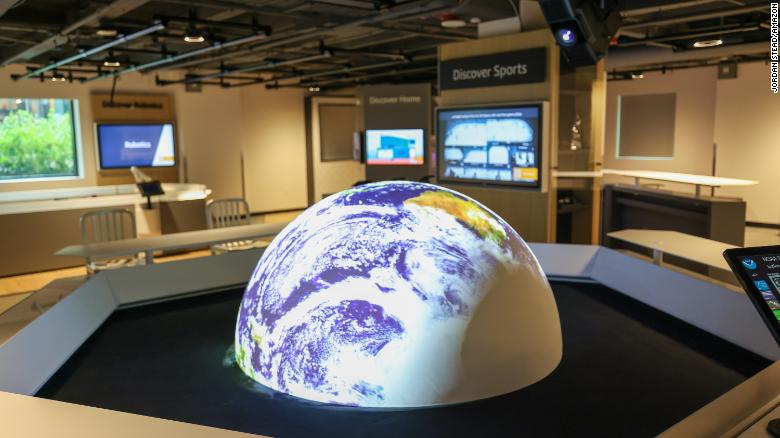Virtually one year ago, when a locked-down tech world was both computing and commuting to work via the Cloud, Amazon Web Services decided to make a bold commitment.
By 2025, AWS, the world’s most comprehensive and broadly adopted cloud platform, pledged to help 29 million people grow their cloud computing skills for free.
Replay: No cost for tuition. No massive student debt. The educators would be AWS-designed programs, all available on-demand.
The “inspiro” for this free classroom training, which has already helped 6 million people make a pivot in their careers, can today be found in a new AWS cloud commons, the new AWS Skills Center at 1915 Terry Ave in Seattle.
To buttress such a laudable goal, Amazon has launched several new initiatives:
• the launch of AWS Skill Builder, a digital learning experience available in 200 countries and territories. Anyone with an Internet connection and a desire to learn can quickly and easily access more than 500 free, on-demand courses in 16 languages.
• the expansion of the global Amazon re/Start program aimed at helping unemployed and underemployed individuals start new careers in tech. More than 100 courses can be found at Amazon.com.
• the opening of the flagship AWS Skills Center in Seattle, Amazon’s first, dedicated, in-person cloud learning space designed for local community.
“We are proud to be launching this first-of-a-kind center in Amazon’s “home town,” announced Maureen Lonergan, VP, AWS Training and Certification. “The aim is to provide free cloud computing and technical skills training to people from all walks of life and all levels of knowledge.”
A recently released Amazon AWS Global Digital Skills Study underscored that the need for skills training is greater than ever and has increased dramatically due to the pandemic, with 85% of workers reporting that they now need more technical knowledge to do their jobs. Two-thirds of workers are not confident that they are gaining digital skills fast enough to meet future cloud needs.
AWS wants to close the skills gap and make it easy for anyone to learn about cloud computing. The training efforts underway are having material impact on people’s lives.
For example, Charlotte Wilkins was working at a fast food restaurant in the U.K. before losing her job due to the Covid pandemic. Without any background in technology, she turned to the AWS re/Start program to start a whole new career as an Associate Solutions Engineer for a cloud-based company in Manchester.
Another prime example is Jarred Gaines, a personal fitness trainer in Boston. He was on the verge of launching his very first gym when the lockdowns happened, forcing him to close his business before it had the chance to open. He enrolled in the AWS re/Start program and completely pivoted into a new career in Tech.
At the inaugural opening of the AWS Skills Center, vice president and chief evangelist Jeff Barr led a panel discussion on “A New Vision for Workforce Empowerment” among the following participants:
Emily Schaffer, the Managing Director of Technology for YearUp which works with companies like Amazon to connect their hiring needs with 18-24-year-old young adults to cross, and close, the opportunity divide.
Deena Pierott, the founder of iUrbanTeen a STEM plus Arts program and a founding member of Black Women in STEM.
David Keyes, the Digital Equity Program Manager for the City of Seattle.
Tanya Hannah, the Chief Information Officer for King County, Washington, the 12th largest county in the U.S. with over 2.3 million people and the first largest county in Tech.
Barr: The World Economic Forum estimates that by 2025 half of the global workforce will need re-skilling and 97 million new roles will emerge because of digitization. How do you see this challenge impacting the city of Seattle, its businesses, residents and community organizations?
Keyes: It starts with a microcosm of what happens in my household and in my neighbor’s household that enable the use of technology to meet daily needs.
As a city we’re thinking about what is the pathway for folks to get into Seattle information technology departments to apply and build those skills.
When we think about digital equity, we think about four different aspects. Do you have affordable and sufficient Internet service? That has become especially critical during Covid to do your job or pursue your education. Secondly, do you have the device that is appropriate to do what you need to do? Thirdly, do you have the digital skills that can apply to all these various activities in your life?
What is exciting about the AWS Skills Center is discovering how you can apply cloud computing to the combination of home and work and shopping and then, in a city and community context, how we can use those skills to solve the problems of transportation, of environment, of economic success in keeping our small businesses going.
The last aspect on digital equity is the design of those applications and services. How do we bring in the diversity to effectively create accessible, exciting, and meaningful application and skills. How do we create the connective tissue, the pathways between those things?
Barr: With this great pace of change we are seeing now, what are some of the challenges and some off the skills gaps that you are seeing?
Hannah: Today, technology is in every industry: manufacturing, banking, health and human services, and even government. The skills necessary to adapt to the way businesses have changed over the last 18 months have accelerated. What does the enormous amount of data that is being collected tell you about the people you are serving? How do you offer better products? How do you gain the behavioral insights to really build loyalty with your brands?
When we think about accessibility we need to ask ourselves how the technology has helped or impaired those who are sight or hearing impaired. How do you use that tech to make sure you are not biased against a community just because you don’t make your content accessible?
Barr: A finding provided by Accenture estimated that in the U.S. 33 million low-income workers could transition into newly emerging jobs with the right training and they could earn a potential median wage of $35 per hour. What do we need to do, how do we work together, to provide them with greater access to the tech skills, the education and the training they need — especially the underserved and underrepresented communities?
Pierrot: It’s important to build relationships with those communities that are built on trust. The connective tissue is vital — to expose the opportunities and explain where you can go from here with these skills?
Barr: In other words, start from the customers perspective and work backward to what kind of skills are necessary?
Pierrot: Outreach is key. Often times, you have to go where they are. How can I make it easier for them to obtain these opportunities.
Barr: How has the Covid-19 pandemic shifted the needs and priorities of the workforce across the nation, and how does skills training fit into those shifts?
Schaffer: Covid has brought us to a day of reckoning. If the only path or access to economic opportunity is through a university system that requires significant financial investment, and the ability to absorb massive amounts debt, if that is the only path to opportunity, our pathways are woefully insufficient for the world we’d like to live in.
I think we are at a moment where we see AI, automation, remote work and contracted services accelerating to the point where we can now choose the direction we want to move in and home-in on the skills that are required. The AWS Skills Center can provide that access to training and certification. [ 24×7]























